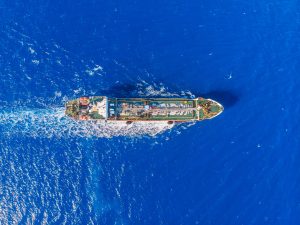The recent policy shifts undertaken by newly inaugurated U.S. President Donald Trump have significant implications for India, particularly concerning the Chabahar Port in Iran. The Trump administration’s decision to modify or rescind India’s sanctions waiver for the port project represents a strategic move to exert “maximum pressure” on Iran. This development raises concerns regarding India’s investment in the port, the future of the International North-South Transport Corridor (INSTC), and broader geo-economic and geopolitical stability in the region.
Trump instructed the U.S. State Department to reevaluate and potentially revoke the sanctions waiver previously granted to India for its development and operations at Chabahar Port. This waiver, initially provided under the assumption that the project was crucial for Afghanistan’s economic stability, enabled India to bypass certain U.S. sanctions imposed on Iran. However, the Trump administration’s move to alter or eliminate this exemption poses a substantial challenge to India’s strategic interests.
India has invested approximately $24 million in equipment and infrastructure at the port, signaling a long-term commitment to enhancing connectivity with Central Asia and Europe. The revocation of the waiver could not only jeopardize this investment but also disrupt India’s broader geostrategic plans, particularly the INSTC, which aims to facilitate trade between India, Iran, Russia, and Europe via an alternative to traditional maritime routes.
The decision to reimpose or intensify sanctions on Iran aligns with the Trump administration’s broader policy of exerting “maximum pressure” on Tehran. This strategy, aimed at curbing Iran’s nuclear ambitions and regional influence, has significant consequences for global geopolitics. Notably, the move strengthens U.S.-Israel relations, as Israel perceives Iran as its principal adversary in the Middle East. Trump’s overtly pro-Israel stance, including statements supporting Israeli sovereignty over contested territories, further reinforces this geopolitical alignment.
For India, this development creates a diplomatic dilemma. On the one hand, India seeks to maintain strong strategic and economic ties with the United States. On the other, India has historically maintained cooperative relations with Iran, particularly concerning energy security and regional connectivity. The increasing U.S. pressure on Iran complicates India’s ability to navigate these competing interests without jeopardizing critical aspects of its foreign policy.
If the Trump administration’s decision leads to renewed sanctions on Chabahar Port, India’s broader trade and connectivity ambitions will face considerable setbacks. The INSTC, envisioned as a critical trade corridor linking South Asia with Eurasia, hinges significantly on Chabahar’s operational viability. If a trade route gets blocked, India would have to search for other opportunities that would involve using Israel and the UAE as transit hubs for Europe. These alternatives might not provide the same level of strategic value as the path through Iran, especially when it comes to expenses and weight in the region.
Furthermore, Russia and China are likely to continue their economic engagements with Iran in spite of U.S. sanctions. Russia has shown interest in strengthening its economic and security ties with Tehran. Similarly, China’s Belt and Road Initiative (BRI) has provided Iran with alternative economic partnerships, thereby mitigating some of the intended effects of the U.S. “maximum pressure” campaign. This further underscores the limitations of unilateral sanctions and the growing multipolarity in global economic relations.
The Indian government is currently assessing the long-term implications of these policy changes and exploring potential diplomatic engagements to secure its interests. One possible response could involve greater engagement with multilateral institutions such as the United Nations to emphasize the legality and legitimacy of India’s infrastructure investments in Iran. Additionally, India may seek to negotiate bilateral arrangements with the European Union (EU) and other strategic partners to mitigate the effects of U.S. sanctions.
The broader question is whether India will continue to adhere to unilateral U.S. sanctions or challenge their legitimacy in favor of its sovereign economic and strategic interests. New Delhi has maintained a tight relationship with the United States in part by abiding Washington’s sanctions, but has also shown signs of independent foreign policy action regarding energy security and regional inter-connectivity.
In a nutshell, the Trump administration’s decision to revoke India’s sanctions waiver for Chabahar Port represents a significant geopolitical challenge. This move disrupts India’s investment in Iran, threatens the viability of the INSTC, and forces New Delhi to reconsider its trade and connectivity strategies. The broader ramifications extend to U.S.-India relations, regional stability, and the evolving geopolitical landscape in the Middle East and South Asia. As India navigates these complex dynamics, its response will be critical in shaping its future economic and diplomatic engagements in an increasingly multipolar world.

































